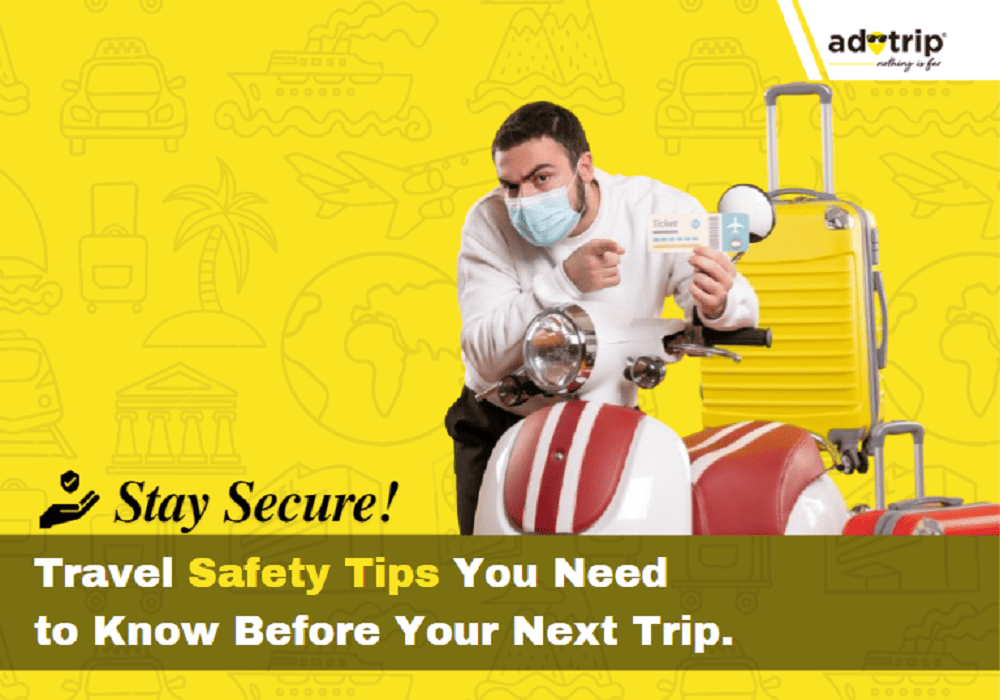
Last Updated At: 17-Oct-2024
Table of Contents
Top 15 Travel Safety Tips- How to Stay Safe on Your Next Adventure
"Travel is the only thing you buy that makes you richer."
But with every trip, it's important to stay prepared and careful. Whether you're walking through busy cities, hiking in the mountains, or relaxing on a beach, safety should always come first. It’s easy to get caught up in the excitement of a new place and forget about the risks. By keeping your valuables safe, learning about the local area, and staying aware of your surroundings, following Top Travel Safety Tips can make the difference between a great trip and a bad experience.
The world is full of amazing places to visit, but being prepared helps you enjoy it even more. By following these Top 15 Travel Safety Tips from Adotrip and taking simple precautions, you can avoid trouble and focus on the fun of travelling. Whether this is your first trip or you travel often, these tips will help make sure your next adventure is both fun and safe. Ready to get started? Let’s go!
Why Does Travel Safety Matters?
Travel safety is crucial to protect yourself from potential risks, avoid scams, and ensure a worry-free, enjoyable trip wherever you go.
- Protects You from Harm- Ensures your physical and emotional well-being during your trip.
- Avoids Theft- Helps keep your valuables safe from pickpockets and other criminals.
- Prepares for Emergencies- Keeps you ready to handle unexpected situations like accidents or natural disasters.
- Prevents Scams- Protects you from common travel fraud and scams targeting tourists.
- Provides Peace of Mind- Helps you enjoy your trip without constantly worrying about your safety.
- Ensures Smooth Travel- Reduces the chances of facing problems that can ruin your plans.
- Keeps You Aware- Promotes being alert and informed about risks in new places.
- Helps in Crisis Situations- Ensures you know what to do and where to go if something goes wrong.
- Reduces Stress- Minimises travel-related anxiety by preparing in advance.
- Avoids Legal Issues- Helps you stay out of trouble by following local laws and customs.
- Protected Travel Documents- Keeps your passport and visas safe, so you don't face delays or cancellations.
- Health Protection- Ensures you take care of your health, including vaccinations and medications.
- Protects Your Finances- Prevents financial loss through careful planning and awareness.
- Prevents Overpacking Risk- Helps avoid unnecessary items that could slow you down or make you a target.
- Increases Travel Enjoyment- When you feel safe, you can relax and truly enjoy the experience.
Top 15 Travel Safety Tips
These essential travel safety tips will help you stay secure, protect your belongings, and navigate new destinations with confidence and peace of mind.
- Research the Destination- Know about local customs, laws, and areas to avoid.
- Keep Copies of Important Documents- Have copies of your passport, tickets, and hotel bookings.
- Share Travel Plans- Let family or friends know your itinerary.
- Use Lockable Bags- Secure your belongings with bags that lock to avoid theft.
- Avoid Flashing Valuables- Don’t show off expensive items in public places.
- Stay Aware of Your Surroundings- Always be mindful of what's happening around you.
- Keep Emergency Contacts- Save important phone numbers, including local emergency services.
- Stay in Safe Accommodations- Choose reputable hotels or lodgings in safe neighbourhoods.
- Avoid Overpacking- Travel light to move around easily and avoid losing luggage.
- Don’t Trust Strangers Easily- Be cautious when meeting new people or accepting help.
- Use Secure Wi-Fi- Avoid public Wi-Fi for banking or sharing sensitive information.
- Carry a First-Aid Kit- Bring essential medical supplies for minor injuries.
- Blend in with Locals- Dress modestly and respect local culture to avoid unwanted attention.
- Stay Sober- Avoid excessive alcohol, as it can impair your judgement.
- Travel Insurance- Purchase insurance to cover emergencies like illness, theft, or trip cancellations.
Common Issues Faced by Travellers Across the Globe
Travellers worldwide face common issues that can disrupt their trips, from lost passports to flight delays. Being aware of these challenges helps in better preparation and smoother travels.
- Flight Delays or Cancellations- Delays and cancellations can ruin travel plans. Always have a backup plan and stay informed about airline policies.
- Lost Luggage- Misplaced baggage is common. Label your luggage clearly and keep essential items in your carry-on.
- Language Barriers- Communication issues in foreign countries can be frustrating. Learn basic phrases or use translation apps to navigate effectively.
- Getting Sick Abroad- Falling ill during a trip can happen. Carry a first-aid kit, travel insurance, and know where local healthcare facilities are located.
- Cultural Misunderstandings- Different cultures have different customs. Research local traditions and etiquette to avoid offending anyone unintentionally.
- Losing Your Passport- A lost passport can disrupt your trip. Report it to the local embassy or consulate immediately and apply for a replacement.
- Travelling with Kids on Long Flights- Managing children on long flights can be challenging. Pack snacks, entertainment, and comfort items to keep them occupied and comfortable.
- Travelling with a Medical Condition- Travelling with a medical condition requires extra preparation. Consult your doctor, carry necessary medication, and have medical documents ready.
Travel Safely With Adotrip
Travel confidently and stay safe with Adotrip by your side. Explore new destinations without worry, knowing we provide reliable guidance and services for a smooth journey. Plan your next trip with Adotrip today!
Frequently Asked Questions about Travel Safety Tips
Q1: What are the safety tips taken while travelling?
A1: Some of the safety travel tips while travelling are:
- Research your destination beforehand, especially regarding local customs and any areas to avoid.
- Keep copies of important documents like your passport, ID, and itinerary.
- Always stay aware of your surroundings and avoid sharing your travel plans with strangers.
Q2: What is safe travelling?
A2: Safety travelling involves taking precautions to protect yourself and your belongings from potential risks such as theft, scams, and accidents while on a trip. It includes awareness, preparation, and following local guidelines for safe conduct.
Q3: What are the three most important travel tips you consider before travelling?
A3: The three most important travel tips are:
- Research the safety of your destination.
- Pack a basic first-aid kit and necessary medications.
- Ensure that your travel insurance covers emergencies like illness or lost luggage.
Q4: What are the do's and don'ts of travelling?
A4: Do’s and Don'ts of Travelling are:
Do's:
- Keep your valuables secure and out of sight.
- Respect local customs and dress codes.
- Stay hydrated and aware of your health.
Don'ts:
- Don’t flash expensive items like jewellery or electronics.
- Don’t engage in risky behaviour like walking alone at night in unfamiliar areas.
- Don’t forget to inform someone about your travel plans.
Q5: What is the safest way of travelling?
A5: The safest way of travelling often depends on the location and circumstances, but using trusted transport services, travelling in groups, avoiding risky areas, and keeping emergency contacts handy are considered safe practices. For international travel, flying with reputable airlines and using well-reviewed accommodations add another layer of security.
--- Published By Adotrip
Latest Blogs

17 Best Places for 2 Days Trip from Delhi

Top 10 Hill Stations Near Bangalore for an Unforgettable Get...

Top 10 Hill Stations Near Chennai For a Perfect Getaway

10 Best Hill Station Getaways Near Gurgaon for Peace Seekers

10 Astonishing Underwater Temples of India You Must Visit in...
Speak to our experts
Popular Flights
Delhi to Patna Flights
Amritsar to Bhubaneswar Flights
Delhi to Delhi Flights
Bangalore to Guwahati Flights
Delhi to Indore Flights
Vadodara to Srinagar Flights
Lucknow to Vishakhapatnam Flights
Delhi to Thiruvananthapuram Flights
Jaipur to Kochi Flights
Bangalore to Dehra Dun Flights






 Dubai
Dubai Malaysia
Malaysia USA
USA






